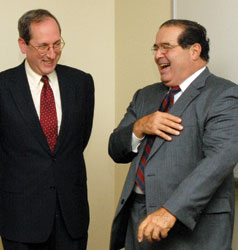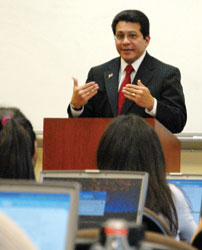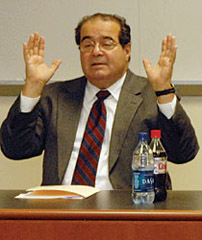 |
|
Attorney General Alberto
Gonzales is escorted to Renee Lettow Lerner's
class by Senior Associate Dean Steven Schooner.
|
Supreme Court Associate Justice Antonin Scalia
and Attorney General Alberto Gonzales lecture
at GW Law
By Laura Ewald
All photos by Claire Duggan
At law schools nationwide, when
students miss classes, they miss out on important
information, lively lectures, and the opportunity
to ask pointed questions. At GW Law, if students
miss class, they risk forfeiting face time with
some of the most influential legal minds in the
world. This fall, Attorney General Alberto Gonzales
and Supreme Court Associate Justice Antonin Scalia
visited the Law School to make a direct connection
with tomorrow’s legal leaders—to teach
as guest lecturers.

|

Dean Frederick M. Lawrence and Supreme Court
Associate Justice Antonin Scalia
|
Both visitors brought unique, real-world perspectives
to the classrooms, and both were in their element:
Gonzales previously served as an adjunct professor
at the University of Houston Law Center, and Scalia
served as a professor at institutions including
the University of Virginia and the University
of Chicago Law School. Both also have connections
to GW Law—professor Brad Clark formerly
served as clerk to Scalia, as did professor John
Duffy; and Gonzales has worked with several GW
Law faculty members and students through both
the White House Counsel’s Office and in
his role as attorney general.
Scalia visited Professor Amanda Tyler’s
seminar on statutory interpretations in mid-October,
discussing different theoretical approaches to
the discipline as well as the role of legislative
history.
“It was an honor to have Justice Scalia
visit our school and the class, not only because
he is such an important jurist, but also because
he is a prolific scholar in the field,”
Tyler says. “My students have read a lot
of his work and studied his decisions for this
course, and he engaged them in conversation, answered
questions, and generally brought the work they
are doing to life in the classroom.”
Mark Knights, a 3L who will clerk on the 10th
Circuit following graduation and who hopes to
practice criminal law, appreciates the “rare
opportunity” afforded by Scalia’s
visit. Knights says the interaction deepened his
understanding of a complex subject.
“A classroom discussion about statutory
interpretation can tend to become an abstract
intellectual exercise,” Knights says. “Whether
one agrees with Justice Scalia’s methodology,
speaking with him underscored that problems of
statutory interpretation cannot be divorced from
either the contexts in which they arise or their
larger implications. It was fantastic to have
the opportunity to question Justice Scalia about
the finer points of his approach.”

Both guest lecturers engaged students in
lively class discussions.

|

|
Classmate Jonathan Bond, a 2L who hopes to practice
appellate litigation in Washington, says he gained
insight not available to many students of the
law through Scalia’s discussion. “When
you read a Supreme Court case, the only dialogue
is between the majority and the concurring or
dissenting opinions; you are often left wondering
how the justices would respond to other arguments
or how they see the decision interacting with
other doctrines and principles,” Bond says,
noting that during the class, “many of these
limitations were absent,” allowing for a
more thorough understanding of the subject.
Scalia visited at the request of Tyler. Clark
says Scalia enjoyed the visit immensely.
In the case of Gonzales’ visit, it was
the attorney general who took the initiative to
contact GW Law. Interested in the chance to teach
in the classroom, Gonzales asked his staff to
look into local possibilities. His staff recommended
he contact Clark, who is currently on sabbatical.
Clark in turn suggested Renee Lettow Lerner’s
class, as Lerner met Gonzales while he was White
House counsel and she was deputy assistant attorney
general for the Office of Legal Counsel at the
Department of Justice.
“I had told my students that a ‘speaker
from the DOJ’ was going to visit, and that
they would very much like to hear him talk,”
Lerner says. “There was a definite gasp
when he walked in the room. But after that initial
surprise, they got into the swing of it and were
very interested to listen to him and ask him questions.
“He was candid with them, and it is obvious
that he very much likes to teach. He was engaging
and warm.”
Lerner says the visit was remarkable in that
it gave the students access to the behind-the-scenes
thought processes that lead to policies and practices
affecting the United States in interesting and
important ways.
“The students got to hear what was at the
center of some very important events, including
recent policies on Guantanamo detainees and matters
of national security,” Lerner says. “They
got to hear from a major decision-maker what was
at the heart of some hard choices.”
GW Law’s ability to attract and facilitate
such notable guest teachers speaks to its location,
strength, and reputation. In addition, Clark says,
students benefit from their ability to secure
internships, clerkships, and other opportunities
with the help of GW Law’s many connections
to Washington and beyond.
“We have so many visitors all the time
who add so much to our classroom experience; visitors
from the Pentagon, the DOJ, the EPA,” Clark
says. “And we also send students out to
them, through internships, clinics, clerkships,
and other ways. These visitors are excited that
they have the chance to work directly with our
students, who represent the future of the law.
“There is no ‘filter’ of the
media, of casebooks, or even of professors’
teaching styles. It is a direct connection that
benefits everyone involved.”
|